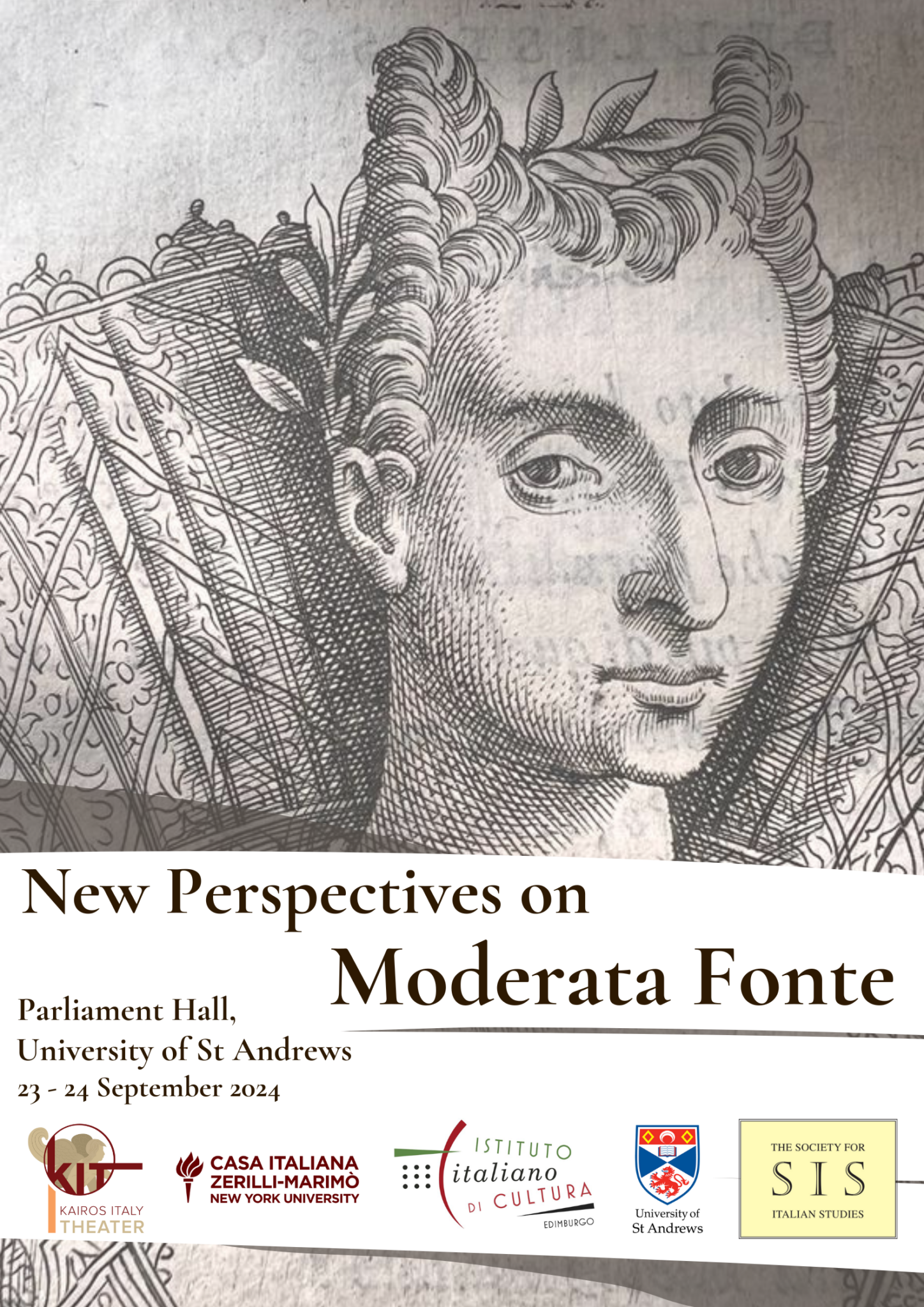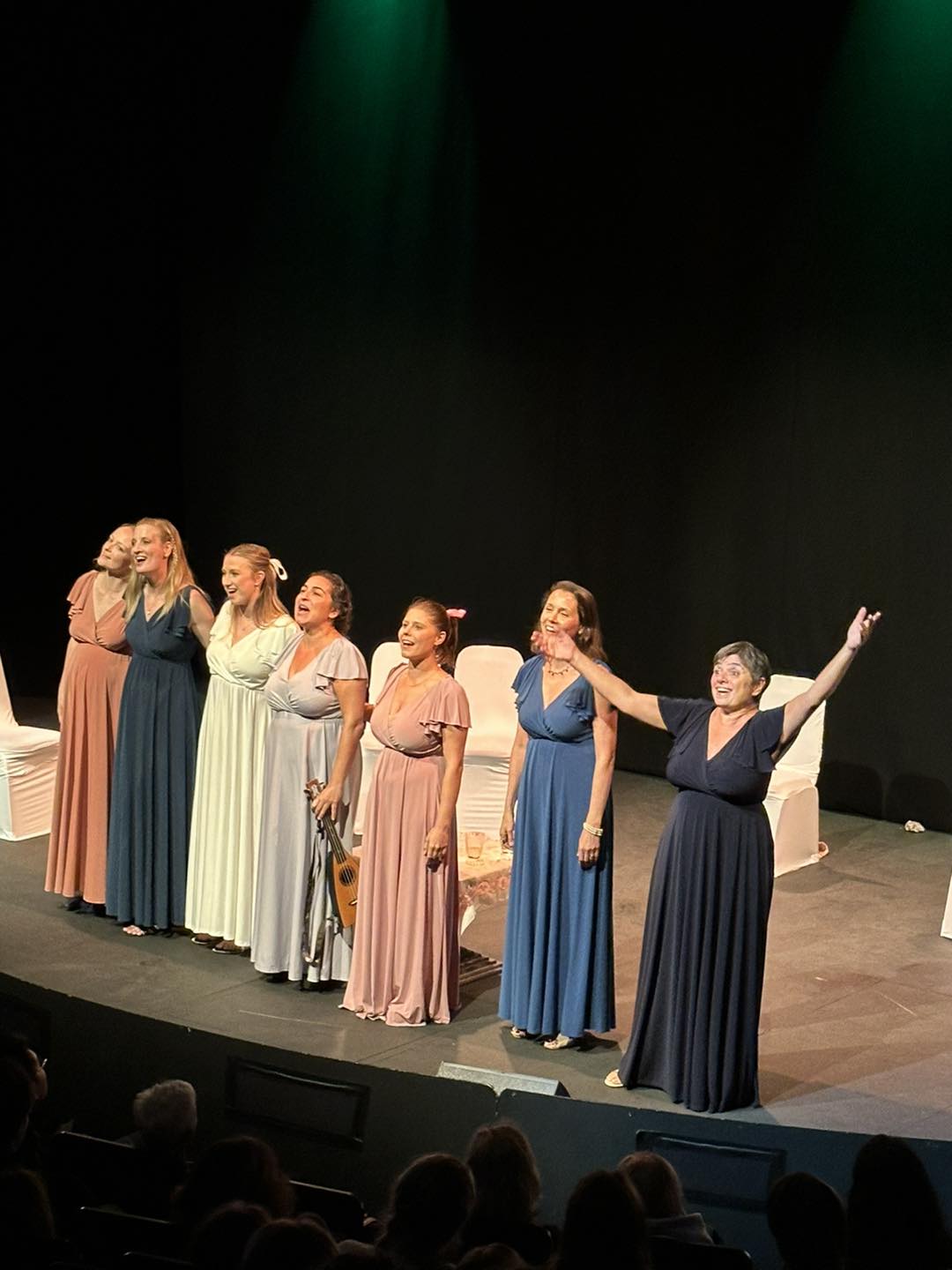23-24 September 2024, University of St Andrews
Organised by Carlotta Moro
Funded by the Society for Italian Studies, the Italian Department at the University of St Andrews, the Italian Cultural Institute of Edinburgh, and NYU Casa Italiana Zerilli-Marimò.
The SIS-sponsored event ‘New Perspectives on Moderata Fonte’ was conceived as an opportunity to share recent scholarship on Fonte and to consider strategies for the promotion of her work. Over the course of two days, participants discussed Fonte’s lesser-known encomiastic poetry and theatrical pieces, revisited her better-known texts Tredici canti del Floridoro (1581) and Il merito delle donne (1600) through new interpretive lenses, explored pedagogical approaches to her writings, and attended a theatrical performance of The Worth of Women.
The first panel, ‘Moderata Fonte: Gender and Genre,’ featured a discussion on Fonte’s proto-feminist reinterpretation of the fairy-tale tradition, presented by Suzanne Magnanini. Eleonora Carinci followed with an analysis of Le feste (1581) and proposed Fonte’s authorship of other anonymous theatrical works. Drawing on a statement in Doglioni’s biography, on an art treatise embedded within Il merito delle donne, and on previously neglected sources, Frédérique Dubard de Gaillarbois highlighted Fonte’s skill in aligning artistic traditions with her central themes of gender and truth.
The keynote speech, delivered by Virginia Cox and titled ‘‘Di rime armata e del tuo egregio nome:’ Moderata Fonte, war poet,’ explored her role as a social lyricist. Probing Fonte’s poems within a collection in honour of King Stefan Báthory of Poland along with documented but lost works, Cox characterised the Venetian writer not as an isolated and marginalised voice, but as a well-integrated member of local intellectual circles and as a respected contributor to literary forms often deemed masculine.
Laura Caparrotti closed the first day by sharing her experience of directing and acting in the stage adaptation of The Worth of Women.
On the following morning, Meredith Ray opened the panel ‘Moderata Fonte’s Il merito delle donne,’ applying ecofeminist theory to examine the gendered dimensions of orality in the dialogue’s treatment of natural philosophy. Erica Ciccarella then reflected on Fonte’s subversive deployment of comedic rhetorical strategies, such as the proverbs and sententiae. Finally, Laura Mattioli shed light on the dialogue’s engagement with the utopian literary tradition, establishing connections with Ortensio Lando, among other possible sources.
The next panel, ‘Moderata Fonte in the Venetian Context,’ included two talks on Tredici canti del Floridoro: Tylar Colleluori proposed that the poem is driven by the distinctively epic ambition to place the Ottoman-Venetian conflicts within a broader mythic and temporal framework, while Katherine McKenna situated Fonte within a local lineage of women who wielded their pens to shape civic mythology during a period of imperial decline. Marianna Orsi concluded with a survey on the relationship between virginity and female power across Fonte’s corpus.
Following a lunch break, the panel ‘Moderata Fonte’s La Passione di Christo (1582) and La Resurrettione di Giesu Christo (1592)’ started with Carlotta Moro, who considered the character of Corinna from Il merito delle donne as potentially affiliated with two non-cloistered communities of women and assessed their influence on Fonte’s rewritings of the Bible. Erminia Ardissino contextualised Fonte’s religious poems within the evangelical and devotional literary tradition, tracing potential sources and reflecting on the author’s catechetical effort. Nilanjana Goswami unveiled intriguing parallels between the depiction of Christ’s torture in Aemilia Lanyer’s Salve Deus Rex Judaeorum (1611) and Fonte’s Passione.
The final panel, ‘Teaching Moderata Fonte,’ addressed the challenges of introducing this author to new generations of students. Caroline Castiglione focused on the theme of intergenerational dialogue within Il merito delle donne and in the classroom, while Claudia Rossignoli explored ‘signature pedagogies’ for the integration of Fonte into the Italian Studies curriculum, noting that this is hampered by the lack of an accessible Italian critical edition of the dialogue.
The celebration of Moderata Fonte concluded at the Byre Theatre, with a stage adaptation of The Worth of Women directed by Laura Caparrotti and Jay Stern and sponsored by NYU Casa Italiana Zerilli-Marimò and the Italian Cultural Institute of Edinburgh.


